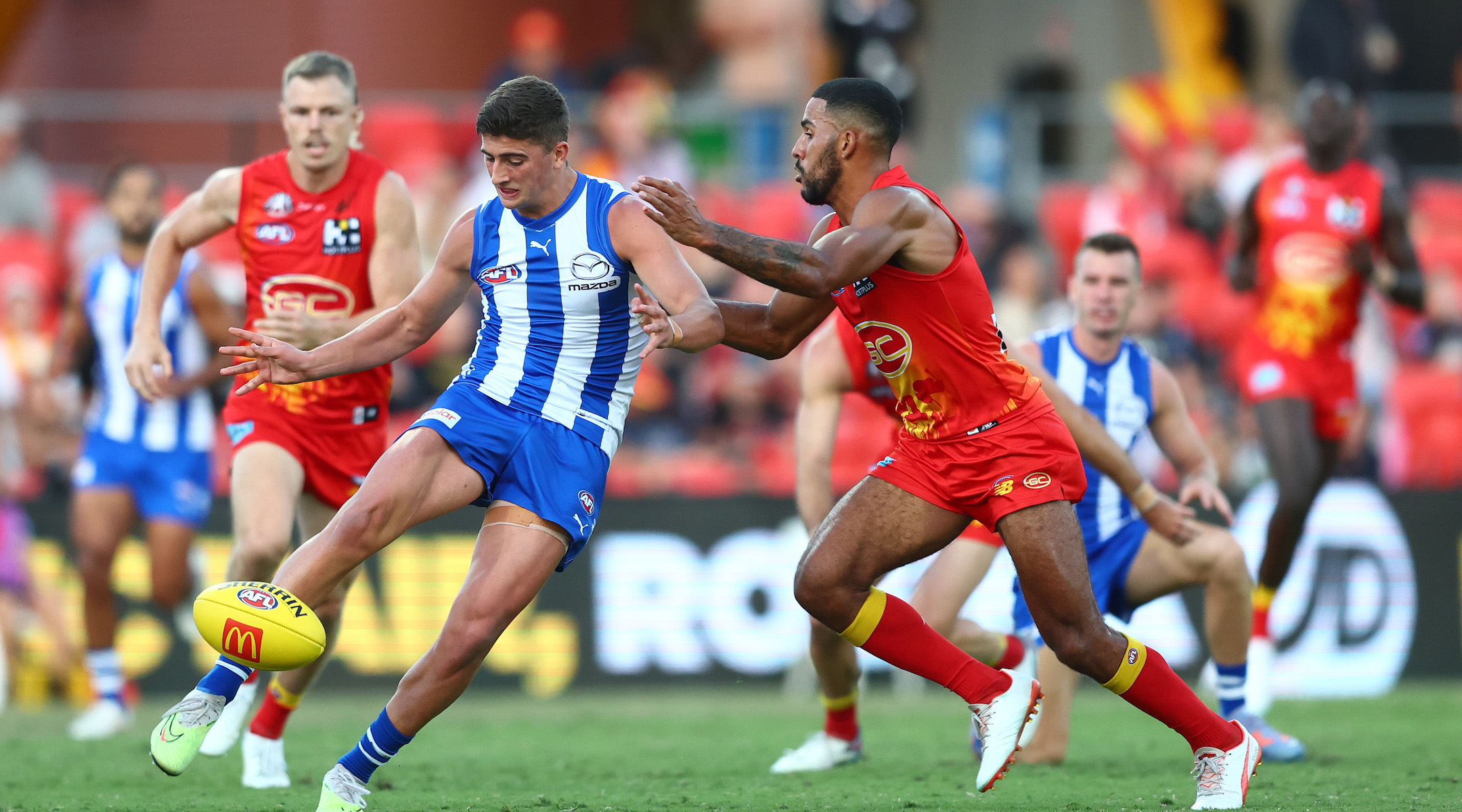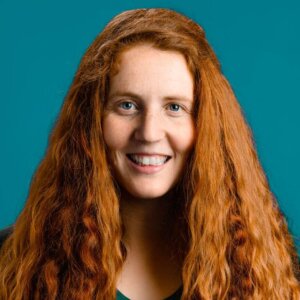Rising football star Harry Sheezel could be ‘greatest ever male Jewish athlete in Australia’
At 18, the Jewish day school graduate has already set a record in Australian Rules Football, the country’s rugby-adjacent No. 1 sport

Harry Sheezel celebrates with Melbourne Kangaroos fans at Marvel Stadium in Melbourne, March 18, 2023. (Daniel Pockett/Getty Images)
MELBOURNE (JTA) — Jews in Australia have seen their community prosper in many areas, from business to the arts to the highest levels of government.
But there is one arena that Aussie Jews have not featured prominently in: Australia’s biggest sport, Australian Rules Football (AFL).
AFL, referred to colloquially as “footy,” is a uniquely Aussie sport, which has been played in some form since teams from Melbourne and Geelong first came together in a paddock in East Melbourne in 1858.
Professional footy is played between two teams of 18 players using an oval ball. Goals are scored when the ball is kicked, airborne, through two tall goalposts set on each end of the oval field. It is similar to rugby but has more players, an oval-shaped pitch and different rules regarding kicking, throwing and tackling.
While many Jews are passionate fans and have been involved with the game’s administration, such as Rabbi Joseph Gutnick, the former president of Melbourne Football club, few Jews have ever played at the highest level of the game.
This has changed with the drafting of a Jewish player, Harry Sheezel, who was selected in November as the 3rd overall pick in the 2022 AFL draft.
A bonafide prodigy, the 18-year-old Sheezel began his footy journey in a local Jewish sporting league, as a member of AJAX (Associated Judaean Athletic Clubs), Australia’s only Jewish football club. Sheezel also graduated from Melbourne’s largest Jewish day school, Mount Scopus Memorial College.
According to Ashley Browne, an Australian sports journalist who wrote a book about Jewish Australian athletes called “People of the Boot,” there have been 11 Jewish football players since 1897.
“It’s very rare for a Jewish player to be drafted to the AFL. It’s been quite incredible,” he said, referring to Sheezel’s meteoric rise. “He spent his whole life at Jewish school. He learned to play football at a Jewish football club. A lot of promising Jewish athletes will go to a [non-Jewish] private school for coaching where there are talent scouts, but Harry stayed at Mount Scopus without having to go to the private school.”
Sheezel is already making a mark. Since debuting in March 2023, he has been ranked in the AFL’s top 10 in disposals — a stat referring to legal touches of the football, which indicates how involved one is in a game (while throwing is allowed in rugby, it isn’t in footy). He set an all-time record for most disposals for a player in their first four professional games (with 127).
After just his first game, his two-year team contract was immediately extended through 2026 and he was nominated for the AFL Rising Star award, which acknowledges the best new player in league competition. The footy season began in March and ends in September.
“You don’t want to get too excited too early, but Harry has the potential to perhaps be our greatest-ever male Jewish athlete in Australia,” said Browne.

Harry Sheezel shown during a match between the Gold Coast Suns and his North Melbourne Kangaroos at Heritage Bank Stadium in Gold Coast, Australia, April 23, 2023. (Chris Hyde/Getty Images)
Mount Scopus, which has produced some famous alumni in its 75-year history — from music industry giant Michal Gudinski to Mark Regev, former Israeli ambassador to the United Kingdom — can now add Harry Sheezel’s name next alongside many of their illustrious graduates.
“Clearly his talents were nurtured in many different environments, but I believe that his time playing footy at school was one of them. We have a strong sporting culture and Harry was very much part of that,” said Mount Scopus principal James Kennard.
In Australia, many minority communities have gained a foothold in Australian society though footy. The AFL has produced stellar Australian Aboriginal players and more recently, other players from diverse backgrounds, such as Islam. Newly-arrived refugees have also been able to find new audiences through their footy skills. The league even has a multicultural ambassador program, through which faith leaders and others promote the sport in diverse communities.
As the first Jewish player drafted this century, Sheezel’s rise is a cause for celebration in Australia’s Jewish community.
“To see a young Jewish man, one who is the product of a Jewish school and a Jewish junior football club, be so widely celebrated and applauded is a source of great pride,” said Rabbi Zach Gomo, one of the AFL’s multicultural ambassadors.
“I’ve definitely felt the support from the community since before I got picked up to now, being on an AFL list and playing league football,” Sheezel said in a statement to the Jewish Telegraphic Agency. “It means a lot to have so much support and genuine care from everyone.”
Those who have coached Sheezel along the way know that he has always been extraordinarily gifted at the sport.
“I coached Harry for 5 years at AJAX Junior Football Club alongside his father Dean,” said Jason Wrobel. “He was always a gun footballer. Even as a 5-year-old, doing Auskick [junior football], he was already very talented.”
Each of Sheezel’s matches have attracted a huge number of Jewish fans, including former Australian Treasurer Josh Frydenberg. While traditionally most Jewish footy fans align with teams that have roots in Melbourne’s historically Jewish suburbs like Carlton, Sheezel was drafted by the North Melbourne Kangaroos, a team that has relatively few fans within the Jewish community.
But this is rapidly changing, and each of North Melbourne’s games now have a large Jewish cheering section. Some of Sheezel’s footy fans have been seen waving Israeli flags, which conveniently align with North Melbourne’s blue and white color scheme.
Those flags caused a brief brouhaha when a complaint about them being waved at the stadium was lodged with the AFL. While the AFL initially advised that in the future Israeli flags would be banned at matches, they quickly walked back this directive by apologizing for the confusion in March and clarifying that Israeli flags were welcome at matches.
Sheezel has also been the brunt of antisemitic comments from other fans — including after the draft.
Dean Sheezel, Harry’s father, doesn’t pay attention to any of the negativity.
“We just ignore that. I don’t give it the time of day. Harry has ignored it too and he doesn’t give it the time of day. He focuses on football, and it doesn’t affect him or us in any way,” he said.
Another problem for the immediate Sheezel family is that they now have to support North Melbourne after 50 years of history supporting Hawthorn, another AFL football team based in a suburb of Melbourne.
“We were mad Hawthorn supporters. We are now fully North Melbourne. You wouldn’t have known I barracked for [supported] Hawthorn for 50 years,” said Dean Sheezel.
Based on the extraordinary start to Harry Sheezel’s footy career, the Sheezel family are likely to be joined by thousands of other Jewish and non-Jewish fans alike.
“Harry Sheezel is going to inspire a generation of young footballers,” said Wrobel. “I think it’s a fantastic example of the path that can be taken for lots of young kids. He is definitely a role model. There are going to be boys and girls trying to follow in his footsteps. In the past there have been some Jewish AFL players, but to achieve this level it was considered, by many, that you couldn’t go to a Jewish school or couldn’t play for a Jewish club. But Harry proves you can, and that is exciting for Jewish kids.”
This article originally appeared on JTA.org.

















